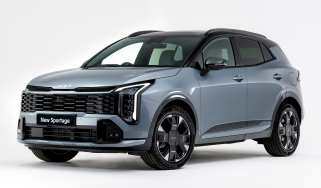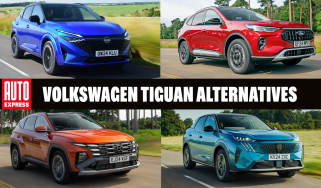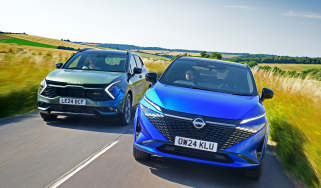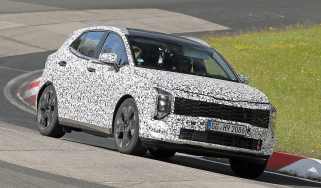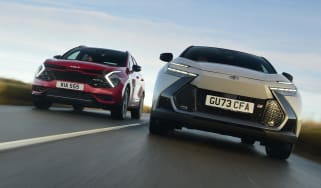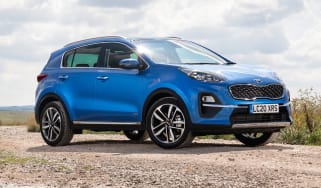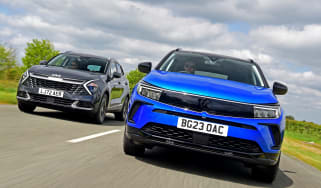Kia Sportage review
Featuring plenty of space, great on-board technology and a comfortable ride, the Kia Sportage is a first-rate family SUV

Is the Kia Sportage a good car?
The latest Kia Sportage certainly stands out amongst its mid-size SUV competition, and not just for its striking looks. It covers a broad range of engine options to suit all needs, while its pricing makes it very competitive. Interior space is also a strong suit, giving the Sportage a key selling point for family car buyers, plus it provides a comfortable ride and a contemporary interior to make it easy to live with.
It’s not perfect, though, with a noisy range of engines that undermine its overall refinement, and its efficiency could be better, particularly amongst a growing range of hybrid rivals.
| Key specs | |
| Fuel type | Petrol, hybrid, plug-in hybrid |
| Body style | Mid-size SUV |
| Powertrain |
1.6-litre, 4cyl turbocharged petrol, front-wheel drive 1.6-litre, 4cyl turbocharged petrol plus 1x e-motor, front-wheel drive |
| Safety | 5-star (Euro NCAP, 2022) |
| Warranty | 7 yrs/100,000 miles |
Kia Sportage: model range, specs and alternatives
Kia offers the Sportage for just under £30,000 in ‘2’ trim, although prices climb quickly, with the top-spec GT-Line S plug-in hybrid car costing close to £46,000. Overall, though, the Sportage is still good value compared to close rivals such as the Ford Kuga and Nissan Qashqai.
The Kia Sportage has evolved from an easily forgettable agricultural SUV into one of the most distinctive and best-selling cars on UK roads. Now in its fifth generation, the current Sportage uses similar head-turning styling cues to those found on the electric Kia EV6 in order to help it stand out from the crowd. Inside, the technology has taken a big step in the right direction, too.
Used - available now

2021 KIA
Sportage
23,584 milesAutomaticPetrol1.6L
Cash £19,999
2023 KIA
Sportage
8,130 milesManualPetrol1.6L
Cash £24,599
2023 KIA
Sportage
53,639 milesManualPetrol1.6L
Cash £15,876
2023 KIA
Sportage
12,827 milesAutomaticPetrol1.6L
Cash £26,950When it comes to powering the Sportage, there’s a wide variety of engine options to choose from. Although there’s currently no fully electric variant, there’s a regular petrol engine accompanied with mild-hybrid tech, along with full hybrid and plug-in hybrid models that can be had with either front- or four-wheel drive.
The regular petrol uses a 157bhp 1.6 T-GDi engine and is available with a six-speed manual or seven-speed DCT automatic transmission, and comes only with two-wheel drive.
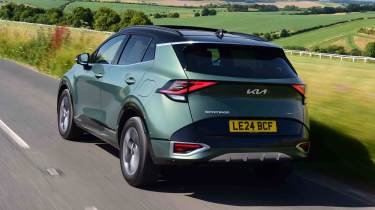
The hybrid and plug-in hybrid models provide more power, with 212bhp and 246bhp, respectively. Both use a six-speed automatic transmission. The PHEV features four-wheel drive as standard, and has a pure electric driving range of up to 43 miles. The regular hybrid comes standard with front-wheel drive or optional four-wheel drive - but only if you go for the top-of-the-range GT-Line S.
Trim levels move from the entry-level '2' specification (only available with the 157bhp petrol engine in manual form) through '3', '4', GT-Line, and GT-Line S. The mid-spec ‘3’ trim is arguably the sweet spot in the range - although the Shadow special edition based on this trim but with a price reduction on top of £650 worth of premium metallic paing thrown in for free is arguably the better value choice. Both ‘3’ and Shadow trims come well-equipped with dual 12.3-inch displays, partial faux-leather upholstery, heated seats, and - provided you go for an automatic or hybrid version - adaptive cruise control.
How much does the Kia Sportage cost?
New models start at £29,980 for the entry-level trim and go up to £45,775 for the top-spec versions. We offer discounts through our Find a Car service which brings the starting price down to around £27,467.
In the used market, prices vary widely depending on age, mileage, and condition. Older models can be found for as low as £1,500, while newer, well-maintained examples average around £18,695.
Leasing options are also available, with monthly payments starting from approximately £2932 for the base trim on a personal lease, with an initial payment of around £2,000. Higher trims and hybrid models are available at higher monthly rates. This makes the Sportage an appealing choice for buyers seeking flexibility across new, used, and lease markets
Engines, performance & drive
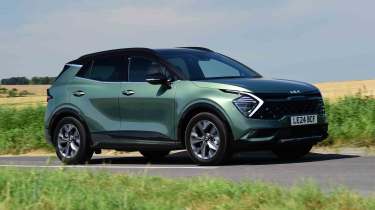
Comfort and refinement are the Kia Sportage’s key strengths. Its soft suspension set-up means this family SUV is able to deal effectively with bumps in the road and reduce unpleasant jolts intruding into the cabin.
There is a feeling that you’re not as well-connected to the road as a Ford Kuga, especially over uneven surfaces and mid-corner undulations, and the Sportage will lean a bit more in corners. If you’re after a sportier drive, you may wish to consider the Mazda CX-5 or even the SEAT Ateca, because both are better for tackling the twisty stuff.
| Model | Power | 0-62mph | Top speed |
| Sportage 1.6 T-GDi 2 | 157bhp | 9.8seconds | 119mph |
| Sportage 1.6 HEV 2WD GT-Line | 212bhp | 8.4seconds | 115mph |
| Sportage 1.6 PHEV GT-Line AWD | 248bhp | 8.4sceonds | 112mph |
What is the Kia Sportage like to drive?
In town
You’ll find the steering in the Sportage to be a touch light and lacking in feel, but the payoff is that the Sportage is easy to pilot around town and in heavier urban traffic – where family car buyers will likely be doing most of their driving. The Sportage (especially in smaller 18-inch wheels) has a smoother and more comfortable ride at low speeds than the Nissan Qashqai.
If you go for the hybrid Sportage, it feels more lethargic when pulling away from a standstill than the equivalent e-Power Qashqai, which has a more responsive accelerator pedal and stronger feeling electric motor.
On A- and B-roads
Once you’ve got over that initial reluctance to move off, the Sportage has enough performance to cater for most people’s needs. On paper, it takes half a second longer to cover the 0-62mph dash than the equivalent e-Power Qashqai, but once rolling, both the Sportage and Qashqai offer similar mid-range grunt. The engine note in the Sportage sounds harsh, though, so it’s best to avoid putting your foot down unless it’s really needed.
The Kia’s softer suspension set-up is clear on a twisty road because there’s more body lean through the turns. It feels a bit lazy when entering a corner, while the steering in the Sportage isn’t quite as precise as a Kuga or Ateca, either. As with the Qashqai, these aren’t huge negatives for a car of this type, and the softer suspension means that for the most part, the Sportage is very forgiving. Some larger compressions can cause the front axle to bounce a couple of times before it fully settles, though.
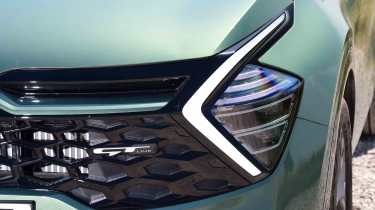
On the motorway
At higher speeds, the Sportage has fine straight-line stability on the motorway, and refinement is generally good. Wind noise is well muted, and road rumble is similarly well contained. The engine in all versions sounds a harsh when accelerating up to the national speed limit, but it quietens down to blend in with the background hum once you’ve reached your cruising speed. There’s enough low-down torque (even in the least powerful petrol) to allow you to leave the car in sixth and not worry all that much about changing down for inclines.
0-62mph acceleration and top speed
The mild-hybrid petrol Sportage is the least potent in the line-up, but it still returns a respectable 157bhp and a 0-62mph sprint time of 9.8 seconds for the manual, or a slightly swifter 9.3 seconds sprint with the dual-clutch automatic. The manual has a top speed of 119mph, while the auto is marginally slower at 117mph.
The 212bhp full-hybrid's extra punch dispatches the 0-62mph run in 8.4 seconds, while the all-wheel drive set-up's extra weight increases the full hybrid's benchmark sprint time to 8.7 seconds. Both versions have a top speed of 115 mph.
The most expensive plug-in hybrid model has more power at 248bhp, but has a bigger, heavier battery and standard four-wheel drive, so it doesn’t get from 0-62mph any faster than the full-hybrid’s 8.4 second time. The top speed is slightly reduced at 112mph.
MPG, emissions & running costs
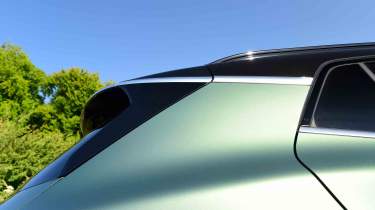
You can get your Kia Sportage in mild-hybrid petrol, full-hybrid, and plug-in hybrid forms, giving everyone from family buyers to business users and everyone else in between a Sportage to suit their driving needs.
The 157bhp 1.6 T-GDi petrol returns up to 43.5mpg on the WLTP combined cycle. Although these figures seem reasonable in isolation, they can’t compete with the more economical full-hybrid and plug-in hybrid variants. It’s worth bearing in mind that improved overall efficiency comes at a price, and the cheapest PHEV model – in GT-Line trim – is significantly more expensive to buy than the equivalent petrol model.
The full-hybrid starts from around £36,000 in GT-Line trim and, depending on specification, manages up to 49.6mpg and 128g/km of CO2.
| Model | MPG | CO2 | Insurance group |
| Sportage 1.6 T-GDi 2 | 43.5mpg | 147g/km | 19E |
| Sportage 1.6 HEV 2WD GT-Line | 49.6mpg | 128g/km | 22E |
| Sportage 1.6 HEV 4WD GT-Line S | 44.1mpg | 146g/km | 24E |
Electric range, battery life and charge time
Thanks to its 13.8kWh battery, the plug-in hybrid Sportage has an electric range of up to 42 miles. Recharging the battery from flat to 100 per cent at home using a 7.4kW wall box charger takes around two hours. The battery is covered by a separate warranty that guarantees it will maintain above 70 per cent capacity over seven years or 100,000 miles, whichever comes first.
| Model | Battery size | Range | Insurance group |
| Sportage 1.6 PHEV GT-Line AWD | 13.8kWh | 42 miles | 26E |
Tax
Company car drivers will find the plug-in hybrid the most appealing due to its low Benefit-in-Kind (BiK) tax rate — although an electric car will be lower still. Its CO2 emissions are 25g/km, allowing this version to fall into the eight per cent BiK bracket (for the 24/25 tax year, nine per cent for 25/26).
The mild-hybrid and full-hybrid versions will be more costly for company car drivers. The 157bhp 1.6 T-GDi emits 146g/km and falls into the 34 per cent bracket, while the hybrid 1.6 HEV emits 129g/km and is in the 30 per cent band.
For private buyers, most of the Sportage petrol and hybrid range (except for the GT-Line S hybrid and GT-Line S AWD versions) avoid the surcharge for cars costing more than £40,000 when new. Unfortunately, none of the plug-in hybrid PHEV models do, so they will cost significantly more to tax from the second year of registration until the car is six years old.
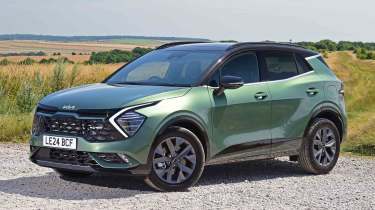
Insurance groups
Insurance premiums for the Sportage shouldn’t be too expensive. Entry-level petrol-powered Sportages in ‘2’ trim starts in insurance group 19 out of 50, while the range-topping GT-Line PHEV four-wheel drive sits in group 26.
None of these insurance groups is alarmingly high for a car in this class, but the closely related Hyundai Tuscon is actually cheaper to insure than the Kia, because this starts in group 16, much like the Ford Kuga.
Depreciation
Our data suggests that the Sportage should hold onto a decent chunk of its value over a typical three-year/36,000-mile ownership period. On average, you should see around a 52 to 59 per cent return on the original list price after this time, with the full-hybrid versions being the best performers. In comparison, the Hyundai Tucson is just behind the Sportage in terms of residual values, retaining around 46-50 per cent.
To get an accurate valuation for a specific model, check out our free car valuation tool...
Design, interior & technology

The key priorities of the fifth-generation Kia Sportage were to have innovative design and advanced technology, so has the Korean automaker succeeded in delivering on its aims? Well, the Sportage’s exterior is certainly striking, with a dramatic, ultra-modern front end that immediately draws the eye. The stretched grille and arrow-like running lights will probably divide opinion, but the overall look is impressive.
What is the Kia Sportage like inside?
In terms of onboard tech, the Sportage draws inspiration from its all-electric Kia EV6 sibling, with mid- to high-spec versions featuring dual 12.3-inch screens that give a panoramic feel to the overall display. It feels like a real step up over the previous model, and the quality is first-rate.
Standard kit on the entry-level '2' trim takes a little of the shine away from the cabin. It has the same 12.3-inch touchscreen as the rest of the range, including Apple CarPlay and Android Auto, but it has to make do with a smaller 4.3-inch digital driver’s display. You have to upgrade to the '3' specification to benefit from the larger 12.3in digital driver display, plus you get partial leather upholstery, heated front and rear outer seats, and a heated steering wheel.
What is the interior quality like?
All the touchpoints, like the materials on the steering wheel and the buttons on it, feel substantial, and contribute to the premium feel to the rest of the interior. It doesn’t quite match the expensive feel of the Peugeot 3008, but it still feels a step ahead of the latest Vauxhall Grandland.
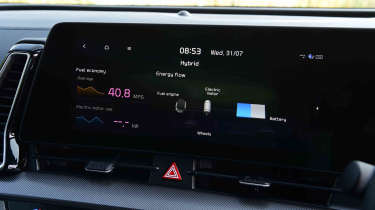
Sat-nav, stereo and infotainment
Sportage models in '3' trim or above come with a pair of curved 12.3-inch screens — as seen in the fully electric EV6. One acts as the instrument cluster, while the other is the touchscreen infotainment system. This set-up works very well, with their near-vertical positioning and concave screens all but eliminating any reflections.
There’s lots of information on offer via the simple menu system, which is easy to navigate. Loading times are fast, while the sharp graphics with black backgrounds are easy to read. The brightness of the screens can be turned all the way down at night so that they don’t dazzle and cause a distraction, too.
Some functions are a little more cluttered than they need to be, however: the driver-assist page, for example, combines a regular menu with a graphical layout of the car’s exterior and the safety functions, while route plotting needs more confirmation presses than necessary, but it’s easy to get along with otherwise.
A useful strip of dashboard trim between the touchscreen and lower control panel — which switches between climate or infotainment controls — is convenient for resting your hand on when using the screen. Wireless smartphone charging is only available on the GT-Line S trim level, but there are USB and USB-C connections on the dash in other variants.
Boot space, comfort & practicality
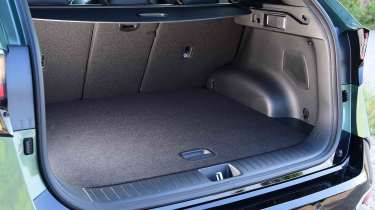
With the Kia Sportage needing to fulfil its daily brief of providing practical, family transport, Kia has included lots of useful touches to help smooth things along. The electric parking brake is located to the right of the steering wheel, which has freed up more storage space, while large hooks are integrated into the front headrests for hanging items. The extra cubby space under the boot floor of the petrol version is particularly useful for stowing oddments on longer journeys. Both the hybrid and plug-in hybrid models have reduced underfloor storage because the battery pack takes up some of this space.
There are plenty of places for your odds and ends in the Sportage's cabin. For instance, there's a wide, open shelf ahead of the gear selector that's big enough for even large smartphones. The central cup holders are wide and deep, and the armrest behind hides another deep bin. The glovebox is a decent size, and the door bins can hold a one-litre bottle.
There are USB-C sockets fitted in the side of the front seats on all but the entry-level ‘2’ models, allowing rear seat passengers to easily charge portable devices. There are cup holders in the back, too, while a three-zone climate control – standard on GT-Line, GT-Line S, and all hybrid and plug-in hybrid models – means occupants in the back can also specify their own temperature setting.
| Dimensions | |
|---|---|
| Length | 4,515mm |
| Width | 1,865mm |
| Height | 1,645mm (1,650mm inc. roof bars) |
| Number of seats | Five |
| Boot space | 587-1,776 litres (hybrid), 562-1,751 litres (petrol), 540-1,715 litres (plug-in hybrid) |
Dimensions and size
At 4,515mm long and 1,865mm wide, the fifth-generation Sportage is a fraction bigger than the previous model. It’s also larger than the Skoda Karoq and Nissan Qashqai.
How practical is the Kia Sportage?
Seats & space in the front
The Sportage offers plenty of room up front, as you’d expect from a family SUV, and fans of a high-riding driving position will appreciate the Kia more, because it feels like you sit much higher than in the almost car-like Qashqai.
All versions get front seat height adjustment, while GT-Line and above come with electric lumbar support for a little more long distance comfort. You’ll need ‘3’ trim and above for electric front seat controls, with the top-of-the-range GT-Line S getting driver’s side memory settings.
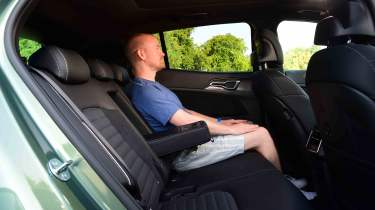
Seats & space in the back
Anyone in the back will appreciate that there’s enough space to accommodate three adult passengers. In our three-way test between the Sportage, Mazda CX-5 and SEAT Ateca, we found the Kia to have the roomiest cabin. When we tested the Kia Sportage against the previous generation Vauxhall Grandland, we measured the cabins and found they offer very similar amounts of rear seat headroom and knee room, although the Kia stretches ahead by quite a margin in terms of elbow room — door to door.
Boot Space
The Sportage provides a decent 562-litre boot, which can be super-sized up to 1,751 litres if you fold the rear seats. Our preferred full-hybrid has even more capacity - 587 litres of space with the seats up, increasing to 1,776 litres with the flexible 40:20:40 split-folding rear seats are lowered. That should be spacious enough for most families needs, but a Ford Kuga has an even bigger boot.
The plug-in hybrid version offers less space due to bits of its hybrid system living under the boot floor. It offers 540 litres of room, expanding to 1,715 litres with the seats folded. Again, the Kuga outperforms the Sportage here, but at least it still offers more than the Mazda CX-5 (506 litres) or Nissan Qashqai (504 litres).
There are some useful features of the boot, such as the amount of space petrol models provide underneath the boot floor to hide smaller items away from sight, and a significantly lower lip on the boot entrance that makes loading heavier items easier.
Towing
The mild-hybrid petrol Sportage models have a 1,650kg maximum braked trailer rating. The full-hybrids have a lower 1,500kg limit, while the plug-in hybrids have the weakest towing ability at just 1,350kg.
If you’re after a similarly-sized SUV with hybrid power and need greater towing capacity, look towards the Ford Kuga. In four-wheel drive hybrid and plug-in hybrid forms, it can pull a braked trailer or caravan up to 2,100kg in weight.
Safety & reliability
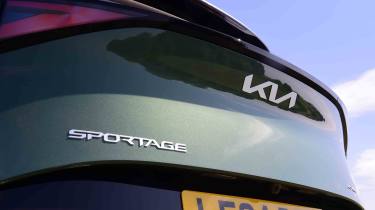
When tested in July 2022, the latest Kia Sportage received a five-star safety score from Euro NCAP – an even more impressive score than its predecessor considering the stringent assessment criteria Euro NCAP has in place.
The standard safety kit is excellent; cruise control, front and rear parking sensors and a rear-view camera are included, along with various camera and radar-based systems that are designed to help prevent or mitigate collisions occurring. These include autonomous emergency braking (AEB), which monitors for pedestrians, cyclists and other cars, initially providing a warning of a potential collision and automatically braking if required.
The lane following assist system works with the lane-keeping assist system when cruise control is engaged to help keep the car between the lines when driving along a motorway or dual carriageway. All automatic models from GT-Line and above have adaptive cruise control, which not only keeps you a set distance from the car in front, but can also bring you to a stop in heavy traffic.
If you upgrade to the top-of-the-range GT-Line S trim, you’ll benefit from blind-spot collision-avoidance to warn you of cars alongside you on the motorway, a reverse parking collision avoidance assist, and a remote smart parking assist if you’re stuck in a tight car parking bay and can’t open the doors to get in.
Kia is often a top performer in our Driver Power customer satisfaction survey, and our most recent results were no exception. The Sportage ranked as the 11th best car to own out of 50 models in the 2024 survey. This was just one of several showings for Kia on this list, with the smallest Kia Picanto finishing one place behind its larger sibling.
| Key standard safety features | Euro NCAP safety ratings |
|
|
Warranty
Kia’s seven-year/100,000-mile warranty beats most of its close rivals, although Toyota offers the opportunity to extend its standard three-year/60,000-mile warranty by one year or 10,000 miles at a time whenever you take your car in for routine servicing at a main dealer, up until the car is ten years old or has covered 100,000 miles.
Servicing
Kia offers service plans that can cover the Sportage from two to five years, and you can pay up front or over monthly instalments. Intervals are 12-months or 10,000-miles – whichever comes first.
Kia Sportage owner reviews
Here’s what owners thought of the Kia Sportage in the 2024 Driver Power survey.
| What they like | What they don't like |
| “Everything is great with my 2022 Sportage GT Line S HEV AWD. I’m enjoying the ownership experience.” | “The touchscreen controls are 50/50 whether they respond or not. It’s very distracting for the driver.” |
| “The quality of the interior is very impressive, with a good blend of finishes and a really modern design.” | “Kia has used too many cheap materials. It shows in the trim and paint, and the car is now too expensive.” |
| “This is my fifth Sportage. It’s the best car I’ve owned and I’ll buy another when it’s time to change.” | “It’s less than 12 months old and has been in the garage so often that it doesn’t seem like a quality product.” |
| “Very modern. I’ve had more unsolicited positive comments about it than any other car I have bought.” | “The mpg is poor, partly through having to drive around trying to get the particulate filter cleared.” |
| “Great balance between performance, reliability and styling. The warranty helps maintain trade-in value.” | “My driver’s seat is so uncomfortable, I get bad backache. It’s even worse in the front passenger seat.” |
| “Acceleration is impressive for a 1.6-litre engine. It’s very responsive, especially with the car in Sport mode.” | |
| “There are plenty of cubbyholes, including a decent-sized glovebox and a box between the front seats. The boot is also huge; there’s loads of room for a pram and bags of shopping.” | |
| “I like how Kia has retained switches rather than using touch controls, as many rivals have done. I’m quite tall at 182cm, but there’s lots of legroom for me, even as a passenger.” | |
| “Given the quality and the amount of standard equipment, the Sportage is extremely good value.” | |
| “The Kia is so much nicer to drive than my old MINI Countryman, because the steering is so much better. The ride is also generally smooth, although it can be crashy on some roads, and the big wheels mean road noise is noticeable.” |
Kia Sportage alternatives
With many capable rivals in the mid-size SUV market, the Sportage has its work cut out. Its closest competitor is the Hyundai Tucson, which is based on the same N3 platform as the Sportage. The Tucson, though, has won our Mid-size SUV of the Year title three times in a row. The Volkswagen Group also offers excellent competition in the form of the SEAT Ateca and Skoda Karoq.
If you want more driving fun, look towards the Ford Kuga or Mazda CX-5. The Nissan Qashqai has previously been a popular choice for family buyers, although it has lost a little of its shine with the arrival of more talented opposition. In this competitive class, it would also be hard to recommend the expensive Honda CR-V or the commendable but dull to drive Vauxhall Grandland. Neither are particularly bad choices; it’s just that other rivals offer a more complete package.
Frequently Asked Questions
The Kia Sportage is striking to look at yet still very practical, features a spacious cabin and slick, user-friendly technology that puts it among the best family SUVs on sale.








